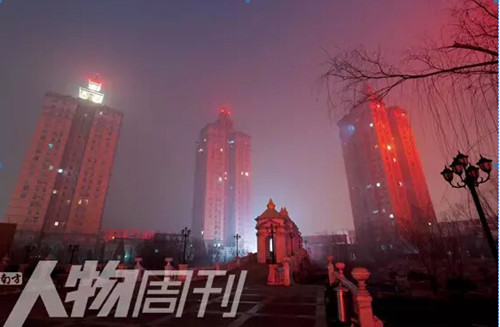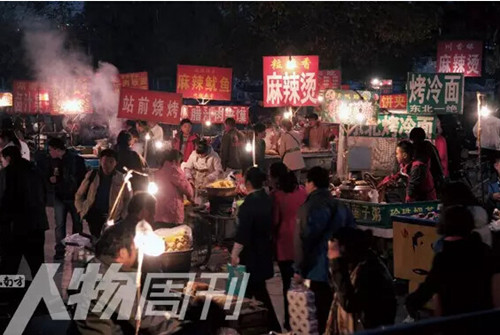
The Tiantongyuan community is shrouded in fog and haze. (Photo/Southern People's Weekly)

Snack stalls gather around the Tiantongyuan community. (Photo/Southern People's Weekly)
For many people, housing in the Tiantongyuan area is relatively affordable. Located in northern Beijing's Changping District and built around an original group of small villages, it epitomizes urban development in the capital over the past several decades, the Southern People's Weekly reported on Tuesday.
Tiantongyuan – a city built on villages
The construction of Tiantongyuan started in 1999 around an existing group of suburban villages. It has now become the largest apartment complex in Beijing and is even dubbed the "largest community in Asia."
Built over an area of about 480,000 square meters, it had a permanent population of 400,000 and a floating population of 600,000 in 2013. Given that the capital's total population was 21 million at that time, this meant that one in every 21 people in Beijing had a connection with Tiantongyuan.
The residential area lies only three kilometers from the Olympic Park and less than 20 kilometers from Tian'anmen Square. Its main transportation links are the expressways to Badaling in the west and Chengde, Hebei Province in the east, subway Lines 5 and 13 (which intersect in the area) and a number of bus lines passing through the community.
The housing price in Tiantongyuan averaged 2,650 yuan per square meter in 1999 and remained almost flat in 2004, when the average housing price in Beijing proper had risen to 7,000 yuan per square meter. As a result, Tiantongyuan attracted many low-income earners and families.
Home to migrants and natives
Many migrant workers and commuters in Beijing see an affordable residence as one of their key needs and desires, and Wu Yang was no exception.
Wu came to Beijing in 2007 and worked at a company with offices near the Ciqikou Subway Station in Dongcheng District. Three years later, he was earning only 3,000 yuan (US$483.7) a month. Given the cost of transportation and rising housing prices, moving to Tiantongyuan seemed a natural choice for him.
Wu's apartment, which was rented for 300 yuan per month, only had the simplest of furnishings - a bed, a wardrobe and a dining table. After a day's work, he returned to his apartment to cook dinner, surf the Internet and sleep.
"Young people like to come to Beijing to advance their career. Many of them are rich and powerful people and even come from middle-class families," Wu said. "This place is relatively cheap, and even though it's on the periphery, it is still Beijing."
Wu also described Tiantongyuan as "a haven for grass-roots people."
"Most people tend to live here only for one or two years. When their wages rise, they'll leave. There are few recreational activities in the community, so we have to travel into the city center."
Wu moved out of Tiantongyuan in June 2012 when he got a new job that boosted his monthly salary to 8,000 yuan.
The lack of schools in the area has also quickened resident turnover.
Ms. Li, a Beijing native, complained about the lack of good schools in the community. "There's a Tiantongyuan primary school, but few people want to send their kids there. The whole city faces this problem, but it is particularly prominent in this area."
For many people, the area is limited to a place where they come to eat and sleep.
Security is also an issue concerned. There was no police station in Tiantongyuan until August 2007, despite the fact that the population has drastically increased over the past decade. Local gangs actively collect "protection fees" from small shop owners and those with small carts and booths.
Ding Qi, a man from north China's Inner Mongolia, has operated a small restaurant in Tiantongyuan since he first came to the area in 2003. He said that many of his relatives have worked and lived in the area, selling garments, groceries and daily necessities.
Ding reported that security and community management fall far short of his expectations. He has had to pay a five-yuan "protection fee" to gangsters every day to avoid troubles.
Problems need to be carefully addressed
The development of Tiantongyuan reflects the problems that are constantly emerging from Beijing's rapid development.
Zhang Yan, a professor of human geography at Beijing Union University, has spent years studying the development of Tiantongyuan.
"Population flow will have much impact on the future quality of Tiantongyuan. If it cannot attract a comparatively stable and middle-class group of people, the quality of the community will fall into a vicious cycle," Zhang asserted.
She said, "With the completion of the housing projects, the developers have lost interest in convenience for residents, and corresponding public facilities are not in place."
She also believes that community management in Tiantongyuan is out of control, resulting in residents' lack of a strong sense of community.
















































